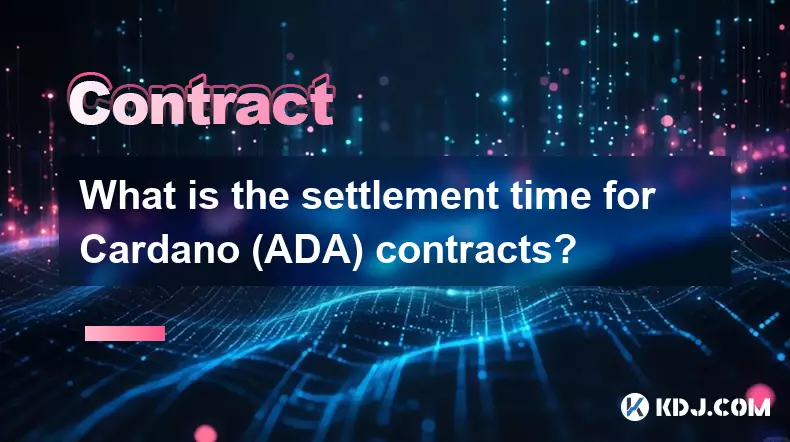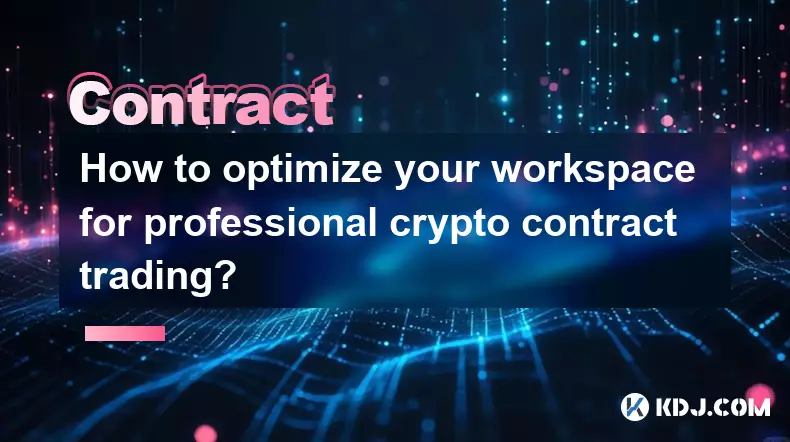-
 bitcoin
bitcoin $87959.907984 USD
1.34% -
 ethereum
ethereum $2920.497338 USD
3.04% -
 tether
tether $0.999775 USD
0.00% -
 xrp
xrp $2.237324 USD
8.12% -
 bnb
bnb $860.243768 USD
0.90% -
 solana
solana $138.089498 USD
5.43% -
 usd-coin
usd-coin $0.999807 USD
0.01% -
 tron
tron $0.272801 USD
-1.53% -
 dogecoin
dogecoin $0.150904 USD
2.96% -
 cardano
cardano $0.421635 USD
1.97% -
 hyperliquid
hyperliquid $32.152445 USD
2.23% -
 bitcoin-cash
bitcoin-cash $533.301069 USD
-1.94% -
 chainlink
chainlink $12.953417 USD
2.68% -
 unus-sed-leo
unus-sed-leo $9.535951 USD
0.73% -
 zcash
zcash $521.483386 USD
-2.87%
What is the settlement time for Cardano (ADA) contracts?
Cardano's smart contracts settle in 15–20 seconds with high security, thanks to its 1-second block time and probabilistic finality.
Sep 28, 2025 at 04:18 am

Understanding Cardano's Contract Settlement Mechanism
1. Cardano operates on a proof-of-stake consensus model known as Ouroboros, which fundamentally influences how transactions and smart contracts are confirmed across its blockchain. Unlike energy-intensive proof-of-work systems, Ouroboros divides time into epochs and slots, with each slot representing a 1-second interval during which a designated stake pool can produce a block.
2. The settlement of a Cardano smart contract does not occur instantaneously but follows a deterministic confirmation process based on block finality. A transaction involving a Plutus script—Cardano’s native smart contract language—is considered highly secure after approximately 15 to 20 block confirmations. Given that a new block is produced every second, this translates to a practical settlement window of 15 to 20 seconds under normal network conditions.
3. Finality in Cardano is achieved probabilistically, meaning confidence in irreversible settlement increases with each subsequent block added to the chain. For most decentralized applications (dApps) and exchanges, waiting for 15 blocks ensures over 99% certainty that the transaction will not be rolled back, even in rare forks or network disruptions.
4. The actual execution time of a contract also depends on the complexity of the Plutus script. Lightweight operations such as token transfers settle faster, while intricate logic involving multi-signature validations or state transitions may require additional computational resources and slightly longer processing within a block.
5. Network congestion has minimal impact on settlement duration due to Cardano’s layered architecture and predictable block issuance. Even during high-demand periods, transaction inclusion remains efficient, preserving consistent settlement timing compared to chains with variable block intervals.
Factors Influencing ADA Transaction Speed
1. The primary determinant of transaction speed is the slot leader schedule, which rotates among stake pools every epoch (five days). As long as the assigned slot leader is online and functional, a transaction submitted just before a new slot begins can be included within one second.
2. Transaction fees, though typically low, play a role in prioritization. Transactions with fees below the minimum threshold may be dropped by nodes, delaying propagation and confirmation. However, fee adjustments rarely cause significant delays given the network’s throughput capacity.
3. Wallet and node infrastructure affect perceived speed. Light wallets relying on external providers might experience slight lags in reflecting confirmed states, whereas full-node users observe near real-time updates. This discrepancy does not alter actual settlement time but influences user experience.
4. Propagation latency across the global node network is negligible due to optimized peer-to-peer communication protocols. Once a block producer includes a transaction, it disseminates across the majority of nodes within milliseconds, ensuring rapid validation.
5. Off-chain metadata attachments or large datum sizes can marginally extend processing time, especially if they exceed size limits and require segmentation. Proper formatting reduces overhead and maintains optimal settlement performance.
Comparative Performance in the Smart Contract Ecosystem
1. When benchmarked against Ethereum, which averages 12 to 15 seconds per block, Cardano offers comparable or superior settlement speeds despite supporting formal verification and enhanced security features in its contracts.
2. Solana boasts sub-second finality under ideal conditions but relies on centralized clock synchronization, making it vulnerable to outages. Cardano maintains decentralization without sacrificing much in terms of speed, offering a balanced alternative.
3. Blockchains like Polygon or Binance Smart Chain achieve fast settlements through delegated models with fewer validators. While faster at peak times, their reduced node count compromises censorship resistance—a trade-off Cardano avoids.
4. Algorand uses a pure proof-of-stake model with immediate finality, yet its adoption of smart contracts remains limited compared to Cardano’s growing dApp ecosystem. This restricts practical utility despite technical advantages.
5. Cardano’s combination of rapid block production, robust finality guarantees, and scalable design positions it as a competitive platform for time-sensitive financial contracts and decentralized applications requiring reliable settlement within seconds.
Frequently Asked Questions
How many confirmations are needed for a Cardano contract to be secure?A minimum of 15 block confirmations is widely accepted as secure for most use cases. This provides strong protection against chain reorganizations and ensures irreversible settlement.
Can Cardano handle high-frequency trading via smart contracts?Yes, its predictable block timing and low-latency finality make it suitable for high-frequency applications, especially when combined with layer-2 solutions designed to further reduce interaction delays.
Do Plutus script failures affect settlement time?Failed script validations prevent transaction inclusion entirely rather than delaying them. These transactions are rejected during mempool validation, so they do not enter the settlement pipeline.
Is there a difference between transaction confirmation and contract execution?Confirmation refers to the transaction being recorded on-chain, while execution involves running the Plutus logic. Both happen simultaneously upon block inclusion, meaning execution result and settlement occur together.
Disclaimer:info@kdj.com
The information provided is not trading advice. kdj.com does not assume any responsibility for any investments made based on the information provided in this article. Cryptocurrencies are highly volatile and it is highly recommended that you invest with caution after thorough research!
If you believe that the content used on this website infringes your copyright, please contact us immediately (info@kdj.com) and we will delete it promptly.
- UAE Investor Secures Major Stake in Trump-Linked Crypto Firm Amidst Shifting Geopolitical Tides
- 2026-02-02 07:10:01
- Pepe Meme Coin: Navigating the Hype, Price Predictions, and Future Outlook in 2026 and Beyond
- 2026-02-02 07:05:01
- Blockchain Gaming's Quiet Revolution: Unpacking Latest Trends and Industry Insights Amidst Market Shifts
- 2026-02-02 06:30:01
- IPO Genie, Tokenization, and YouTubers: The Big Apple's Next Big Bet on Democratized Wealth
- 2026-02-02 06:40:02
- Aptos in a Bind: Downtrend Deepens, But a Brief Relief Bounce Looms Before the Next Plunge
- 2026-02-02 07:00:01
- Pi Network, ATL, and Community: Navigating the Currents of a Mobile-First Crypto Movement
- 2026-02-02 07:00:01
Related knowledge

How to close a crypto contract position manually or automatically?
Feb 01,2026 at 11:19pm
Manual Position Closure Process1. Log into the trading platform where the contract is active and navigate to the 'Positions' or 'Open Orders' tab. 2. ...

How to understand the impact of Bitcoin ETFs on crypto contracts?
Feb 01,2026 at 04:19pm
Bitcoin ETFs and Market Liquidity1. Bitcoin ETFs introduce institutional capital directly into the spot market, increasing order book depth and reduci...

How to trade DeFi contracts during the current liquidity surge?
Feb 01,2026 at 07:00am
Understanding Liquidity Dynamics in DeFi Protocols1. Liquidity surges in DeFi are often triggered by coordinated capital inflows from yield farming in...

How to use social trading to copy crypto contract experts?
Feb 02,2026 at 07:40am
Understanding Social Trading Platforms1. Social trading platforms integrate real-time market data with user interaction features, enabling traders to ...

How to trade micro-cap crypto contracts with high growth potential?
Feb 01,2026 at 02:20pm
Understanding Micro-Cap Crypto Contracts1. Micro-cap crypto contracts refer to derivative instruments tied to tokens with market capitalizations under...

How to optimize your workspace for professional crypto contract trading?
Feb 01,2026 at 08:20pm
Hardware Infrastructure Requirements1. High-frequency crypto contract trading demands ultra-low latency execution. A dedicated workstation with a mini...

How to close a crypto contract position manually or automatically?
Feb 01,2026 at 11:19pm
Manual Position Closure Process1. Log into the trading platform where the contract is active and navigate to the 'Positions' or 'Open Orders' tab. 2. ...

How to understand the impact of Bitcoin ETFs on crypto contracts?
Feb 01,2026 at 04:19pm
Bitcoin ETFs and Market Liquidity1. Bitcoin ETFs introduce institutional capital directly into the spot market, increasing order book depth and reduci...

How to trade DeFi contracts during the current liquidity surge?
Feb 01,2026 at 07:00am
Understanding Liquidity Dynamics in DeFi Protocols1. Liquidity surges in DeFi are often triggered by coordinated capital inflows from yield farming in...

How to use social trading to copy crypto contract experts?
Feb 02,2026 at 07:40am
Understanding Social Trading Platforms1. Social trading platforms integrate real-time market data with user interaction features, enabling traders to ...

How to trade micro-cap crypto contracts with high growth potential?
Feb 01,2026 at 02:20pm
Understanding Micro-Cap Crypto Contracts1. Micro-cap crypto contracts refer to derivative instruments tied to tokens with market capitalizations under...

How to optimize your workspace for professional crypto contract trading?
Feb 01,2026 at 08:20pm
Hardware Infrastructure Requirements1. High-frequency crypto contract trading demands ultra-low latency execution. A dedicated workstation with a mini...
See all articles










































































